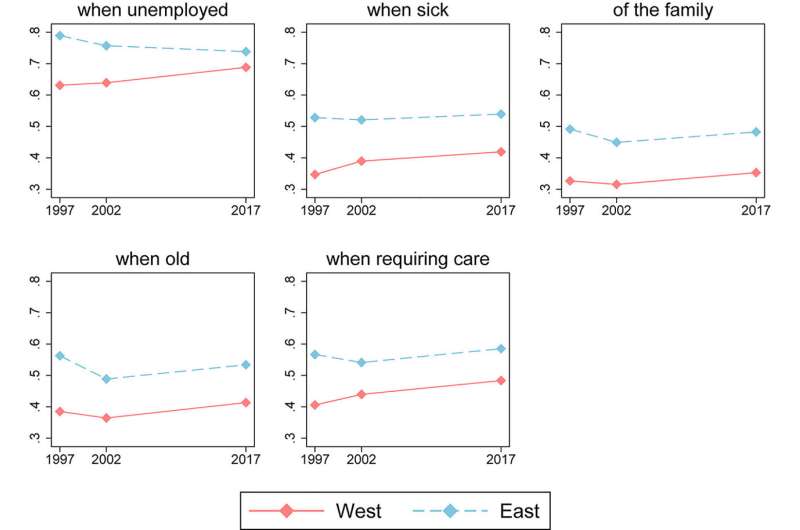East and West Germans show preference for different government systems 30 years on

Even after 27 years of reunification, East Germans are still more likely to be pro-state support than their Western counterparts, a new study published in German Economic Review finds. Of the sample studied, 48% of respondents from the East said it was the government’s duty to support the family compared to 35% from the West.
The study led by Prof. Nicola Fuchs-Schündeln of Goethe University Frankfurt, Germany builds on her earlier work which evaluated results from the German Socio-Economic Panel, a regular survey of around 15,000 households. The survey has been running in the federal states that made up West Germany since 1984 and in those of the former East Germany since 1990.
In 1997 and 2002, respondents were asked who they thought should provide financial protection for groups such as families, the elderly, the sick and disabled, and so on, using a scale from one (only the state) to five (only private forces). This question was asked again in 2017, allowing Fuchs-Schündeln and the paper’s co-author Mariia Bondar to see how preferences were further changing over time.
West and East Germans have been moving towards a common level of preference for state support over the years. However, the extra results from 2017 indicate this rate of convergence is slowing. “In our original study, we concluded that if the convergence continued at its original pace we wouldn’t see any differences in one or two generations,” said Fuchs-Schündeln. “However, that wasn’t the case.”
Interestingly, East German preferences for more state support appear to be passed on to the next generation. The researchers found that people born between 1990 and 1999 (that is, after reunification) who had at least one parent from the former GDR were significantly more likely to think that it was the state’s responsibility to provide financial security for families and the elderly.
“That means that living under different systems can have really long-lasting effects on preferences, which are passed down from one generation to the next,” said Fuchs-Schündeln.
These results highlight that even though unification happened in 1990, key differences still survive. “It’s a bit of a call for action on how we can generate a more unified Germany,” said Fuchs-Schündeln. “It tells us we shouldn’t take it for granted that separation is not a topic anymore.”
More information:
Mariia Bondar et al, Good Bye Lenin Revisited: East-West Preferences Three Decades after German Reunification, German Economic Review (2023). DOI: 10.1515/ger-2022-0042
Citation:
East and West Germans show preference for different government systems 30 years on (2023, March 17)
retrieved 17 March 2023
from https://phys.org/news/2023-03-east-west-germans-years.html
This document is subject to copyright. Apart from any fair dealing for the purpose of private study or research, no
part may be reproduced without the written permission. The content is provided for information purposes only.
For all the latest Science News Click Here
For the latest news and updates, follow us on Google News.

